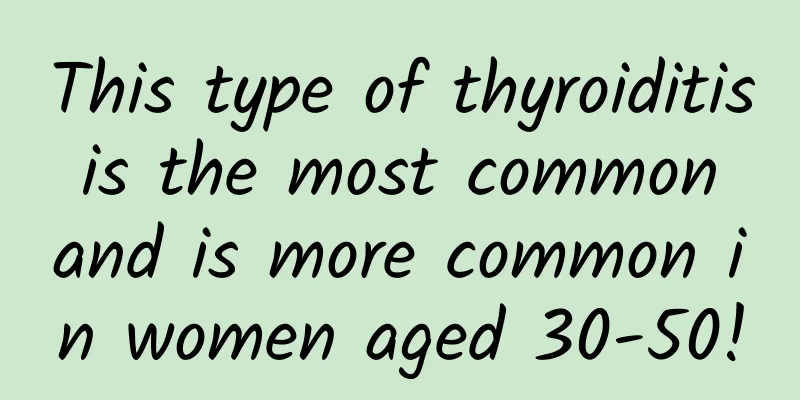What are the symptoms of menstruation?

|
Menstruation is something that every woman has, but for some women who have never had menstruation, they are usually very concerned about their symptoms, fearing that they will have their period one day but don’t know it. This would be very embarrassing because when women have their first period, the amount of bleeding is very large, and if they are not careful, their pants will get dirty. So what are the symptoms of menstruation? Let’s take a look at it together. What are the symptoms before menstruation? For example, some women will feel back pain and abdominal pain a few days before menstruation, while some women will feel uncomfortable, weak, and emotionally unstable. The onset of menstruation will bring different symptoms to each woman. The main symptoms before menstruation include: 1. Premenstrual symptoms may include fatigue, general discomfort, sadness, drowsiness, and even crying or anger for no reason. 2. In severe cases, patients are unwilling to talk to their family members and friends, and are so lonely that they are bedridden. They often suffer from breast tenderness, abdominal distension, and constipation. Others gain weight and have edema 1 to 3 days before their period, especially swollen fingers in the morning and lower limbs in the afternoon. 3. Some people also have symptoms such as poor concentration, forgetfulness, difficulty in judgment, uneven movements, and headaches before menstruation. Experts say that the above symptoms can occur as early as 10 to 14 days before menstruation, usually 4 to 5 days before menstruation, and the symptoms will disappear after menstruation comes. It should be noted that the above symptoms do not occur in the same person at the same time. Usually only 1 to 2 of them will occur. One of the physiological characteristics of the female reproductive system is its cyclical changes, and menstruation is an important sign of this cyclical change. The menstrual cycle is mainly regulated by the interaction between the hypothalamus, pituitary gland and ovary. The hypothalamus regulates the function of the pituitary gland, and the pituitary gland regulates the function of the ovary. The endometrium undergoes cyclical changes under the action of ovarian hormones. The sex hormones produced by the ovaries, in turn, act on the hypothalamus and pituitary gland, affecting the release of gonadotropin-releasing hormone, follicle-stimulating hormone and luteinizing hormone, which is the so-called feedback effect; when their release is inhibited, it is called negative feedback, and when their release is promoted, it is called positive feedback. The relationship between the changes in blood hormones during a normal menstrual cycle and the ovaries and endometrium is as follows: After the corpus luteum atrophies in the previous menstrual cycle, the secretion of estrogen and progesterone decreases, relieving the inhibition of the hypothalamus and pituitary gland. Gonadotropin-releasing hormone produced by the hypothalamus enters the anterior pituitary through the pituitary portal vein system, promoting the secretion and release of follicle-stimulating hormone and luteinizing hormone. Under the synergistic action of follicle-stimulating hormone and luteinizing hormone, the follicles in the ovaries gradually develop and mature, and produce estrogen, causing proliferative changes in the endometrium. After the follicles mature, the first peak of estrogen appears in the body. The increase in estrogen secretion produces a feedback effect on the hypothalamus and pituitary gland, inhibiting the production of follicle-stimulating hormone, promoting the increase in luteinizing hormone secretion, resulting in a luteinizing hormone peak and triggering ovulation. After ovulation, the corpus luteum is formed and secretes estrogen and progesterone. Under their combined action, the endometrium undergoes typical secretory phase changes. After ovulation, estrogen levels temporarily decrease, followed by a second, lower peak. In fact, many women do not have any symptoms during menstruation. If menstruation is normal, many people will feel uncomfortable. This varies from person to person. Many women with good physical fitness will not have any symptoms during their first menstruation. Therefore, when you reach a certain age, you must always be prepared to avoid sudden attacks of menstruation, which is not good. |
<<: How to treat chronic endometritis
>>: What to do if you have menstrual endocrine disorders?
Recommend
What fruit is good for milk production?
Some mothers will feel that they do not have enou...
The benefits of stretching for women
Stretching the muscles means stretching the tendo...
Can I wash my hair on the first day of my period?
In the modern people's aesthetic view, many p...
What medicine should I use if there is a fishy smell down there?
In life, many women will suffer from some gynecol...
Hiccups in early pregnancy mean boy
Nowadays, our lives are really good, so many fami...
Urine occult blood in women
Urine occult blood test is also called urine occu...
Lying down and playing with mobile phone every day during pregnancy
Many pregnant women will have someone advise them...
How many days is the confinement period after miscarriage?
The time of confinement after miscarriage is the ...
Is occult blood in women's urine serious?
Urine occult blood is a common disease that can o...
Best time for pelvic recovery after childbirth
From the moment a woman becomes pregnant, her bod...
Peak absorption period of cerebellomedullary cistern
The posterior cranial fossa cistern, its other ac...
What happens if I eat ice cream during my aunt's visit?
The weather is getting hotter and hotter, and mos...
Why is the pufferfish called pufferfish in the sea? The difference between porcupinefish and pufferfish
Pufferfish have migratory habits and can live in ...
Have you ever experienced the “wake-up service” that feels like an electric shock?
Source: Youlai Healthy Life...
What is the meaning of the idiom "羊了羊"?
Recently, a stacking elimination game called "...









